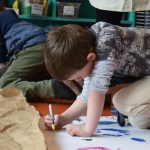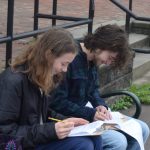
Since September, Kimberly Williams Brown, Ph.D., and Robin Alpern have been engaging PDS faculty and staff in an anti-oppressive, co-facilitated dialogue program called Intergroup Dialogue (IGD). Intergroup Dialogue is a strategic way to engage in dialogue across differences with the explicit purpose of building stronger, more equitable communities. We use intergroup dialogue because it was originally developed on a college campus (University of Michigan – Ann Arbor) to respond to the needs of student racial strife and unrest in the early 1990s. Because of its roots in higher education, intergroup dialogue is grounded in the theories, knowledge, research, and pedagogical principles drawn from the scholarship of teaching and learning and Allport’s (1954) theory of intergroup relations. We firmly believe that “by recognizing the centrality of social group affiliation based on race, gender, sexual orientation, religion, and other socially constructed categories, intergroup dialogue fosters a critical examination of the impact of power relations and social inequality on intergroup relations.”
We have introduced the group to this particular co-facilitated approach in the hopes that teachers and staff will implement the tenets of the pedagogy through their curriculum and through their administrative roles. Intergroup Dialogue is organized around four stages:
1. Group beginning (creating shared meanings of dialogue)
2. Identity, social relations, and conflict
3. Issues of equity, fairness, and inclusion (hot topics)
4. Alliances and empowerment
We are currently working our way through stage four of the model and we have been asking questions about how allyship is established, who gets to claim allyship, the difference between allyship and co-conspiracy, and the possibility and limitations of taking action in allied relationships.
For the future, we are confident that PDS teachers and staff will use IGD to affect change in our school. We know that teachers and staff have always been sensitive to and have had a variety of training in anti-oppressive practices that the practice of IGD has strengthened through acquiring tools that allow them to lean deeply into dialoguing across difference.



